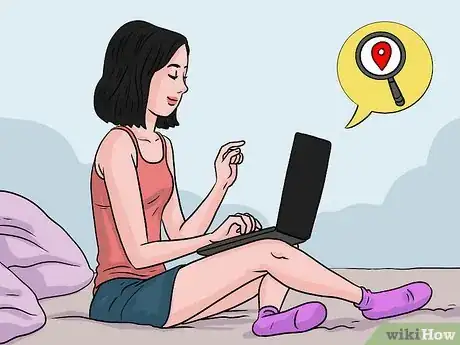This article was co-authored by Donna Novak, Psy.D. Dr. Donna Novak is a Licensed Clinical Psychologist based in Simi Valley, California. With over ten years of experience, Dr. Novak specializes in treating anxiety and relationship and sex concerns. She holds a BA in Psychology from the University of California, Los Angeles (UCLA) and a doctoral degree (Psy.D) in Clinical Psychology from Alliant International University-Los Angeles. Dr. Novak uses a differentiation model in treatment that focuses on personal growth by increasing self-awareness, personal motivation, and confidence.
There are 7 references cited in this article, which can be found at the bottom of the page.
This article has been viewed 23,540 times.
Change is always difficult, and moving is a huge change. Everything is different, scary, and new. Nothing is the same, and it can be very hard to adjust to a move. Whether you are a teen moving to a new state and school, or a young adult moving away from family, there are ways to cope.
Steps
Coping with Moving in General
-
1Before you even begin packing up, start to get to know your new home. The Internet and library may contain lots of good information about the place you're moving to. Everything will feel much more familiar much more quickly and prepare you for the move.
- Brainstorm your interests, talents, skills, hobbies, passions -things you enjoy- and find the locations, phone numbers, and other important information about the places where those activities take place. It could be a club at your new school, which would be great to help you adjust quickly.
- When you're visiting your new school, find out if there are activities or clubs you're interested in and see if you can still join if the deadline hasn't already expired. It'll give you a great opportunity to meet new people and make friends. You could meet people who have similar interests as you.
-
2Keep in touch. One of the biggest fears of moving is losing friends and slowly becoming more and more distant. Being so far away means rarely seeing your friend anymore, and busy schedules make it difficult to contact one another, and there is always the factor of being replaced with a new friend, which can complicate things and ruin friendships.
- Print out pictures of you and your friends together and put them in your room. Print some copies for your friends as well. This will help you remember one another and may comfort you when the prospect of moving gets you down. Constantly seeing these photos is a gentle reminder that your friends will always be there for you.
- There are many forms of communication for staying in touch. Share pictures and videos. Let your friends know about the differences, both good and bad, between your old home and your new place, and update them on the most interesting things that have occurred. Call and text one another frequently, if possible. You might be able to plan visits during summer, spring or winter break for you to visit your friend or for them to visit you.
Advertisement -
3Don’t push yourself or your feelings. Remember to give yourself time to adjust and feel better in general. Don't pressure yourself to know how you feel about the move, this does nothing but shove a big reminder in your face that the move has been difficult. Moving is normally related to the feelings of uncertainty or loneliness. While it is completely okay to feel sad or upset at times, it is essential let this thought or feeling go away by itself without clinging to it. There is no need to ponder about it or excessively think about it, either.
-
4Stay in a good mood when possible. Find new hobbies, go to new places and meet different people. Try to find positive experiences to build a positive feeling about the new home and keep your mind of the difficulty of moving. Staying home and being moody about it will not change the facts, and it will only make you more upset.
- Make the best your current situation and move on. Don't live in the past, it will only make the move more jarring and it won't help you at all. Remember what's important, and relive memories that make you smile. You can relive your past, but make sure it keeps you in a positive mood.
-
5Don't focus on minor, troubling details. Always stay calm and don't allow small things to send you over the edge. Ignore things like the moving boxes that have to be unpacked, your home in chaos, etc. These can tick you off, since they a constant reminder of the change you're going through.
- Think of this as a temporary situation which is going to be over soon. It will just be replaced by something even better. Know that moving can be hard, but it'll make way to a better situation and perhaps after needing some time to cope, could make you happier than you were at your old home.
- Consider it a fresh start. With a clean slate, you can change everything and improve as well. If you had issues with other people, you are now rid of these problems and can avoid repeating this conflict. With past mistakes, you can use your mistakes to become a better, new person. You can recreate your reputation and make it better.
- Think of it as a new opportunity to let go of all the worries and stress you had living at your current home. It could be an opportunity to start all over, making a new, more successful new beginning. It simply takes changing your thoughts from negativity to trying to find the good in every situation.
-
6Before moving, write about what you'll miss and what you're excited about. This a great exercise to do with your whole family or on your own. Make a list about what you will miss about your old home and what you look forward to. The first part, about missing home, is a great way to de-stress and get your feelings out in a calm way. The second part will build up your optimism and get you feeling a little better about your move, knowing that there are positive factors in it, while being honest at the same time by acknowledging that you will miss home.
- If your whole family each makes a separate list, come together and discuss it. This will give you the feeling that others understand what you are going through and that you are not alone. Compare what you will miss and what you are excited for. With a little work and creativity, you may be able to find that what you miss might be replaced by something even better in your new home.
-
7If you are a teen, purchase or ask your parents for a journal. A "moving journal" is a great place for you to express how you feel about this major change in a private, non-judged, and honest way. You can let everything out onto the paper whether it be by writing, drawing, or anything else. Whatever lets you express your emotions freely will work great.
- Before moving, add in pictures of friends, the neighborhood and home. It can be a type of scrapbook that you can look back on when you've moved into their new home. Look at this scrapbook when you feel nostalgic or are missing home, or if you are feeling upset about the move, add an entry to the journal.
-
8Be honest with yourself. Sometimes you sugarcoat your move without realizing it – promising yourself that life will be so much better at the your new home. This is done in hopes of distracting yourself from the negative feelings and hard reality. But doing this can raise your expectations unrealistically and set yourself up for disappointment later on.
- While too much sugarcoating can be set up for disappointment, keeping positive is key. Have realistic expectations and don't change reality. Search for the best in your situation instead and try to remain optimistic.
Dealing with Moving Away from Your Family
-
1Agree upon a set time to talk with your family. Try not to text, instead use the phone, or if available, a video chatting program or app, such as FaceTime or Skype. Depending on your personal preferences and schedule, this may be daily, weekly or monthly. At first, it's better to schedule more frequent chats, even if they feel excessive, and slowly back off and reduce the chat time as you feel more comfortable in your new home.
- Having a planned time to hear from your family gives you peace of mind, knowing you will soon talk to your family regardless of your busy schedule or anything else that may be difficult to handle. It will comfort you knowing that your family is still there for you even when you aren't with them.
- Take advantage of technology based communication. Emailing, texting, or using social media allows you to check on your family when it is convenient for you, allowing you to feel connected even if you are far apart physically.
-
2Choose a few of your favorite family photos and place them in important areas of your new home. Try to put them where you'll see them often, such as your room or your hallway.
- If you enjoy crafting or it is your specialty, create a photo collage of your family instead of using framed photos, whether it be digitally (you can set it as your wallpaper) or handmade.
- Seeing the familiar faces of your family provides a sense of closeness and helps you still feel connected to them, as if they are there with you.
-
3Keep your most cherished souvenirs/keepsakes. These meaningful and precious items will provide comfort when you start to miss your family. Before you leave home, pack your most valued keepsakes (for example, family pictures, old birthday cards, toys from your childhood, etc.). These should all be things that remind you of “home sweet home.”
- Once you arrive at your new home, decorate your home or room with those keepsakes. When you start missing your family, pull out one of them. While you may feel homesick at first, eventually you will adjust and feel like yourself again.
- These keepsakes can be anything, no matter how small or insignificant they seem. If they are significant to you, it is enough.
-
4Get a job. Even if you do not technically need a job, still try to find one. Because work takes up a lot of your time, it will distract you, so you are not sitting around, alone and sad, missing your family. It will also help you meet new people and make new friends. Working will also help you feel more productive, which could motivate you to try to achieve your goals.
- If you are unable to work, school/college will achieve the same purpose. Enroll in some classes at your local college, go back to earn a degree, and you will be so distracted with coursework, homework and friends to have time to sit around and brood.
-
5Get involved in your new community. Battle loneliness and homesickness by keeping busy. Join a social group, club, volunteer organization, gym or sporting team in your city. By participating in these activities you can do what you enjoy, meet new people, and make new friends.
- Before moving, do a little research on your town to find out more about what it has to offer. For example, if are a hiker, find out where your town's best parks are. If you enjoy reading, find out if there's a pleasant bookstore in the neighborhood or a cozy library.
- When you arrive in your new community you will already have ideas of how to spend your free time, rather than just brooding about how much you miss home and your family.
-
6Embrace new challenges and celebrate successes. While being away from your family can be difficult, it is important to focus on yourself and your freedom. Though challenges can be difficult or thought of as negative, they can also be very fulfilling to overcome. Moving away from your family will push you to your limits, but know that by sooner or later, you will be a better person because of it.
- Celebrate every success you have, no matter how small it is. You don’t always have to share this victory with someone. It’s yours and you're not obligated to tell everyone.
- Write down the successes in a journal and look back on it when you feel challenged or can’t move forward. Perhaps you were really nervous about meeting your new co-workers and beginning your new job, but they all greeted you with open arms and your work day was great. Remind yourself that you are capable of rising above your challenges.
Warnings
- If you begin to struggle with severe depression, your feelings of sadness related to missing your family or moving seem out of proportion to the situation, linger for extended periods of time or your behavior is drastically altered, speak to a licensed psychologist, counselor or your physician to find out if you need extra help.⧼thumbs_response⧽
References
- http://www.mymovingreviews.com/move/coping-with-moving-away
- https://oureverydaylife.com/deal-moving-away-family-13414.html
- http://www.movers.com/moving-guides/moving-away-from-your-family.html
- http://au.reachout.com/moving-away-from-friends-and-family
- http://www.ehow.com/how_8792904_deal-moving-away-family.html
- http://moving.about.com/od/movingwithchildre1/fl/Top-10-Ways-to-Get-Kids-Excited-About-Moving-to-a-New-House.htm
- http://www.lifehack.org/articles/lifestyle/7-ways-to-mentally-cope-with-moving-abroad.html









































































